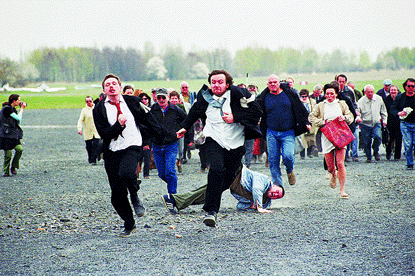By Rania Richardson
Is the Tribeca Film Festival on the brink of becoming the premiere showcase for international movies in the United States, on par with festivals in Toronto and Cannes? With the foreign contingent making up roughly 50% of the 160 features in Tribeca, New Yorkers can once again look forward to abundant global cinema below Canal Street.
Foreign titles dominate the narrative feature and documentary competitions of the festival, and make a strong presence in almost every other category— including midnight movies and family films.
Executive director Peter Scarlet had over two decades of experience working in the worldwide festival arena before he was recruited by Tribeca in late 2002. “Too many good foreign films can fall under the radar of even a sophisticated city like New York,” he says, and spends most of the year traveling the globe in search of entries to add cultural breadth to the programming.
The sheer scale of Tribeca allows for a larger number of foreign titles than any other New York festival, with work this year from Colombia to Finland to North Korea. Because many films come without a pedigree via awards from other festivals or international buzz, it is a “discovery” festival. Nevertheless, with each passing year, the selection is stronger and its reputation for offering quality material improves. Premieres and spotlight screenings, filmmakers old and new, make the Tribeca Film Festival an eclectic mix of increasingly sophisticated programming.
Here are a few intriguing selections from across the categories:
“2046”
A futuristic continuation of the stylish “In the Mood for Love,” by writer/director Wong Kar-Wai, following the original story of the platonic affair of a writer (Tony Leung) and his neighbor (Maggie Cheung) in 1960s Hong Kong. The new film traces the writer’s erotic adventures with a variety of women (including Zhang Ziyi and Faye Wong) and the science fiction tales he sets in 2046, the pivotal year for Hong Kong independence. Christopher Doyle’s alluring cinematography contributes to this international art-house favorite.
“Czech Dream” (Cesky Sen)
Consumerism and media manipulation are satirized in this documentary by Prague film students Vit Zlusak and Filip Remunda. Their stunt fooled thousands who turned up for the opening of a nonexistent supermarket following a fake advertising campaign. Citizens felt betrayed by the filmed exploit, even as it opened their eyes to their country’s post-communist acquisitive culture, since taxpayer money went towards a state funded grant used to make the film.
“The Night of Truth” (La Nuit de la Verite)
The first feature film by Burkina Faso director Fanta Regina Nacro. In an imaginary West African country, peace negotiations are attempted between a government army and a gang of rebels, following a civil war. A night of festivities is planned to celebrate the end of the decade-long conflict, but reconciliation may be out of reach. The film delves into the female perspective of war, as well as ethnic, religious, and political issues in modern Africa.
“The Ax” (Le Couperet)
A dark comedy by Greek director, Costa-Gavras (“Missing”) that transposes a Donald Westlake novel to France. When a chemist loses his job to outsourcing, he responds by physically eliminating his competitors in the ruthless job market. The film stars Jose Garcia with a supporting role by Olivier Gourmet (“The Son”) as a rival businessman on his hit list. The political Costa-Gavras stirred controversy in 2002 with “Amen,” a story implicating the Vatican in Nazi efforts, and here takes a critical look at the cut-throat world of business executives.
“Boats out of Watermelon Rinds” (Karpuz Kabugundan Gemiler Yapmak)
Called a Turkish “Cinema Paradiso,” the semi-autobiographical first film by Ahmet Ulucay was shot on a shoestring budget on digital video. Two peasant boys from a small Anatolian village work as apprentices to finance their dreams. One works for a watermelon vendor, the other for a barber. By rigging up a makeshift projector they screen film discarded by the local theater. Movie career dreams and unrequited love round out the coming of age story.
“Aaltra”
A black comedy and an oddball buddy escapade starring its filmmakers Benoit Delepine and Gustave Kervern who embark on a road trip across Europe via wheelchairs. The cantankerous pair journey to Finland to hunt down the Aaltra tractor company whose equipment crippled them. The sinister humor of the film is so deadpan it verges on the politically incorrect. Tribute is paid to Finnish filmmaker Aki Kaurismaki with cameo role.
“Shutter”
From the land that produced the original cult hit, “The Eye,” comes another thriller, this time by first time filmmakers Parkpoom Wongpoom and Banjong Pisanthanakun. A woman who is killed in a photographer’s hit and run accident comes back for revenge as a haunting apparition that appears in photographs, in this Thai ghost story that is chilling from beginning to end. It features a history of spirits seen in photographs, as well as all the classic characteristics of the genre.
WWW Downtown Express



























